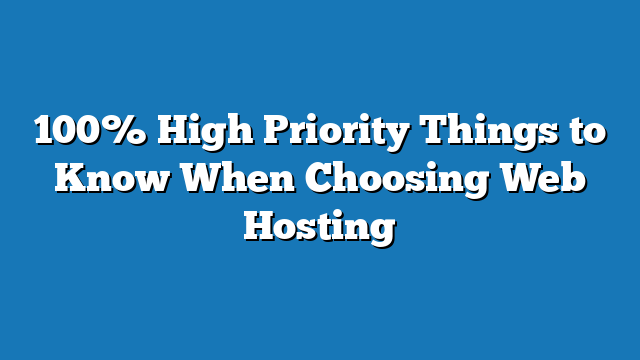Discover the high-priority factors to consider when choosing web hosting. Learn about web hosting price, performance, security, and support to make an informed decision.
Table of Contents
Introduction
Choosing the right web hosting provider is crucial for the success of your online presence. With numerous options available, it’s essential to understand the key factors that can impact your website’s performance, security, and reliability. This guide will cover the high priority things to know when choosing web hosting, ensuring you make an informed decision that enhances your website’s success.
1. Understand Your Hosting Needs
Before diving into specifics, it’s essential to understand your website’s requirements. Consider factors such as the type of website (blog, e-commerce, portfolio), expected traffic, and the technical expertise of the person managing the site. This initial assessment will help you choose a hosting plan that meets your needs without overpaying for unnecessary features.
2. Evaluate Web Hosting Performance
Website performance and uptime are crucial for providing a good user experience and maintaining high search engine rankings. Look for hosting providers that guarantee at least 99.9% uptime. Additionally, check performance metrics such as server speed, data transfer rates, and resource allocation. Providers that use SSDs and offer CDN (Content Delivery Network) services typically provide better performance.
3. Assess Web Hosting Security
Security is paramount for any website, especially if you handle sensitive information such as customer data. Ensure that your hosting provider offers robust security features, including SSL certificates, DDoS protection, firewalls, and regular backups. Additionally, check if they provide malware scanning and removal services to keep your website secure.
4. Consider Scalability
As your website grows, your hosting needs may change. Choose a hosting provider that offers scalable plans, allowing you to upgrade resources such as CPU, RAM, and storage without significant downtime or hassle. Scalability ensures that your website can handle increased traffic and resource demands smoothly.
For scalable options, consider VPS Hosting France.
5. Check Customer Support
Reliable customer support is essential for resolving issues quickly and efficiently. Look for hosting providers that offer 24/7 support through various channels such as live chat, phone, and email. Additionally, check customer reviews to gauge the quality of support provided. Providers with a responsive and knowledgeable support team can save you time and frustration.
6. Compare Web Hosting Costs
While cost shouldn’t be the only factor in your decision, it’s essential to compare pricing plans across different providers. Look at what each plan offers in terms of storage, bandwidth, and additional features. Some providers may offer discounts for longer-term commitments or include free domain registration and SSL certificates.
7. Review Control Panel and User Interface
A user-friendly control panel makes managing your hosting environment easier, especially if you’re not technically inclined. Popular control panels like cPanel, Plesk, and DirectAdmin offer intuitive interfaces and a range of features for managing domains, email accounts, databases, and more. Ensure that the hosting provider offers a control panel that meets your needs.
8. Look for Additional Features and Services
Consider any additional features and services that may be beneficial for your website. This can include things like automated backups, email hosting, domain registration, and website builders. Some providers offer free domain names or SSL certificates as part of their hosting packages, adding extra value to your plan.
9. Research Reviews and Reputation
Research the reputation of potential hosting providers by reading customer reviews and testimonials. Websites like Trustpilot, G2, and Reddit can provide insights into the experiences of other users. Pay attention to recurring issues and positive feedback to get a balanced view of each provider’s strengths and weaknesses.
For reliable VPS hosting options, you can also explore Infinity Server and Ultimate Free Host.
Conclusion
Choosing web hosting involves balancing several high priority factors, including performance, security, scalability, support, and cost. By thoroughly evaluating your needs and researching potential providers, you can select a hosting plan that offers the best value and meets your website’s requirements. Remember, the right hosting provider can significantly impact your website’s success, so take the time to make an informed decision.
FAQs
What should I consider when evaluating web hosting performance?
Consider factors such as server speed, data transfer rates, and uptime guarantees to ensure optimal website performance.
Why is security important in web hosting?
Security is crucial to protect sensitive information and maintain the integrity of your website. Look for features like SSL certificates, DDoS protection, and regular backups.
How does scalability benefit my website?
Scalability allows your website to handle increased traffic and resource demands smoothly, ensuring optimal performance as your site grows.
Why is customer support important in web hosting?
Reliable customer support helps resolve issues quickly and efficiently, minimizing downtime and ensuring your website remains operational.
What control panel options should I consider?
Consider user-friendly control panels like cPanel, Plesk, and DirectAdmin, which offer intuitive interfaces and a range of features for managing your hosting environment.
What additional features should I look for in a web hosting provider?
Look for features such as automated backups, email hosting, domain registration, and website builders that add extra value to your hosting plan.
